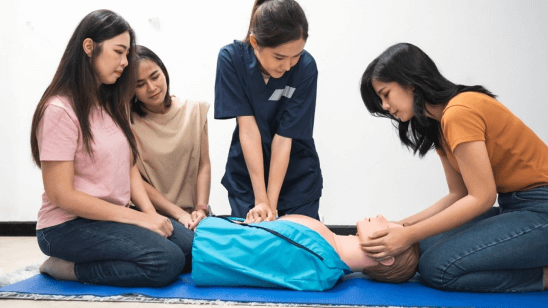Cardiopulmonary resuscitation (CPR) certification might seem necessary for healthcare professionals, but in reality, it's a skill that can benefit you no matter your field. Learning how to perform CPR can greatly improve your work and personal life. This blog offers five reasons why getting CPR certified early in your professional life will distinguish you and help you in many ways.
Benefits of obtaining CPR certification early
Obtaining CPR certification early in your career offers numerous advantages beyond simply learning how to respond to medical emergencies. Your personal and professional lives can benefit from the unique skills it gives you. Here are some key benefits of becoming CPR certified early on:
Increased confidence and leadership skills:
Obtaining CPR certification is not just about learning a practical skill; it’s also about creating a sense of responsibility and readiness. Knowing how to perform CPR gives you the confidence to take responsibility in emergencies. In a situation where a co-worker, client, or even a stranger collapses due to cardiac arrest, you’ll remain calm because you know exactly what to do.
When you know how to handle high-pressure situations, people see you as a leader who can think clearly and act effectively in emergencies. Leadership skills transfer to other aspects of your professional life. Getting CPR training will help you perform better at work by improving your composure, self-assurance, and decision-making abilities.
Enhances workplace safety and builds a health-conscious culture:
One of the biggest benefits of being CPR certified is the immediate improvement in workplace safety. Cardiac arrest can happen to anyone at any time, and immediate intervention significantly increases the chances of survival. When you get training in CPR, it may motivate your colleagues or even your company to make CPR training a part of their employee wellness programs. Many businesses are concentrating on developing health-conscious workplaces with initiatives that address physical and mental health as well as general well-being. Your commitment to learning CPR could be pivotal in creating a culture that prioritizes health and safety.
Expands your career opportunities:
Having CPR certification can result in career opportunities you might not have considered. Although it's necessary for positions in healthcare, childcare, and education, more industries are starting to recognize how important it is to have CPR-trained staff. By adding this qualification to your resume, you can distinguish yourself and show potential employers you have additional valuable skills.
In jobs like event management, fitness training, or public service, being CPR certified shows that you're ready for emergencies and care about keeping people safe. Because of this, you are valued in any position that requires interacting with people. Also, many businesses are beginning to reward staff members who complete CPR training, particularly in customer-facing roles.
Prepares you to perform effectively under pressure:
CPR training teaches you to think fast, solve problems quickly, and remain calm under stressful conditions. These are important skills for any job. Whether you're dealing with a demanding client, a team issue, or a tight deadline, the calmness and focus you practice in CPR situations can make you a better, more composed professional.
CPR training also involves working with others, often requiring teamwork, such as using a defibrillator, performing chest compressions, or giving rescue breaths. This type of problem-solving with a team helps you work well with others during stressful situations, which is a valuable skill in any workplace.
Teaches skills that benefit you and your community:
Getting CPR certified early in your career isn’t just about immediate professional benefits—it’s also about equipping yourself with a lifelong skill. Once you’re trained, you can help save lives, regardless of your career. Even if you never have to use it, simply knowing that you have the power to potentially save a life is incredibly empowering. Remember to get recertified periodically to refresh your skills and stay current with any changes in guidelines.
You could find yourself in a situation where a loved one, a neighbor, or someone in a public place experiences cardiac arrest. With CPR training, you can increase their chances of survival. The broader societal impact of more people knowing CPR is significant—if more individuals are trained, communities become safer.
Conclusion
Getting CPR certified early in your career might not seem important initially, but the benefits are wide-ranging and help you over time. It increases workplace safety, boosts confidence and leadership qualities, and can lead to new professional prospects. CPR certification programs teach you how to handle emergencies, maintain composure in critical situations, and acquire a life-saving skill you can use whenever needed.
Find a recognized and reputable course provider and enroll in an approved CPR course today. Ensure you stay up-to-date with guideline changes and take refresher classes to maintain a valid certification.





Comments